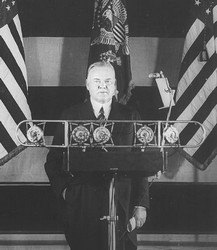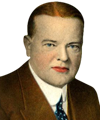Hoover As President
|
| updated |
Copy Link Code
|
 Herbert Hoover, the candidate
Herbert Hoover, the candidate
The presidential election campaign of Herbert Clark Hoover began when then-President Calvin Coolidge decided not to seek a second term in office. As Secretary of Commerce, Hoover was set to run; few men seemed to be so well prepared for the presidency. His accomplishments in public life were many: He had fed the starving people in Belgium, he had been appointed to manage the U.S. Food Administration; he changed the focus and role of the Department of Commerce under two different presidents and he had overseen the federal relief efforts following the Mississippi Flood that encompassed several states. Hoover was seen as being more respectable and realistic than his two predecessors; Americans felt that the self-made millionaire and great engineer would propel the nation into a period of unprecedented prosperity.
Hoover's Democratic opponent, Governor Alfred E. Smith was a colorful product of New York's urban society, a hero to many who supported him as a political figure and a proponent to the repeal of Prohibition.
Hoover continued to campaign on his vision of prosperity for all Americans, which endured him to the voters. His Vice-presidential candidate was Charles Curtis, the first Native American elected to such a prestigious position. In November 1928, Hoover and Curtis defeated Smith by a 58% margin of the popular vote and 444 electoral votes to Smith's 87. It was a resounding victory for a man who had overcome many personal challenges to rise to the presidency; his election was monumental to many. On March 4, 1929, Hoover was inaugurated as the 31st President of the United States. Hoover's inauguration speech centered on prosperity and how it should be distributed more evenly among the people.
Herbert Hoover as the 31st President of the U.S.
As presidential biographies go, Hoover's is one of great ideals and few accomplishments that addressed the needs of a nation at that time in history. Herbert Hoover as president was unable to advance his philosophies of individualism and volunteerism in place of an activist government to aid the homeless and destitute populace during the Great Depression.
Hoover's presidency was an initial swift series of reforms. During his first thirty days, President Hoover expanded civil service protection, cancelled private oil leases on public land and attacked the mob in Chicago, which eventually resulted in the capture and conviction of mobster Al Capone for tax evasion. During Herbert Hoover's presidency, he also added three million acres to the national park inventory and established a Federal Farm Board to support and control farm prices. The 31st president advocated the construction of dams in the Tennessee Valley and California and a system of tax cuts geared to low-income workers.
As president, Herbert Hoover created the Veterans Administration, doubled the amount of hospitals available to treat veterans and required the U.S. Justice Department to flush out and prosecute companies who participated in unfair competition. Herbert Hoover as president advocated for federal loans that would clear urban slums and promote healthier living conditions for the poor.
During the Herbert Hoover term, the Federal Bureau of Prisons was established to institute prison reform, and the Bureau of Indian Affairs was reorganized to better serve the Native American population. Hoover also fostered child welfare conferences to protect the health of children, as well as private home ownership.
The accomplishments of President Herbert Hoover
As president, Herbert Hoover accomplished some major feats considering his term was buried in the Great Depression.
On the economic front, Hoover accomplished the following:
- Establishment of the Federal Farm Board to oversee farming production and loans
- The reform of banking laws that would help eliminate over speculation in the stock market
Domestic policies of Herbert Hoover's presidency included the accomplishments of:
- Improvement of the nation's waterways and construction of Hoover Dam
- Improved law enforcement and prison guard training
- Better health care for Veterans
- Public works projects that enhanced the nation's infrastructure and put people to work
In the area of foreign policy, President Herbert Hoover accomplished:
- A great amount of global disarmament
- The London Naval Treaty
- A "Good Neighbor Policy" with South America and other smaller countries
- A policy of not interfering with the affairs of other countries
After his presidency, Herbert Hoover resided in Palo Alto, California and in an apartment in the Waldorf-Astoria in New York City. He devoted most of his remaining life to humanitarian and civic causes, often speaking on public issues as well as writing over forty books.
Quick President Hoover facts
- Born: August 10, 1874 in West Branch, Iowa to Jesse and Hulda Hoover
- Died: October 20, 1964 in New York City, New York
- Successful mining engineer, businessman and public servant
- Was appointed Food Administrator for the U.S.; served from 1917-1919
- Was Secretary of Commerce from 1921 - 1928 for two presidents
- Elected President of the United States in 1928, serving from March 4, 1929 - March 4, 1933
